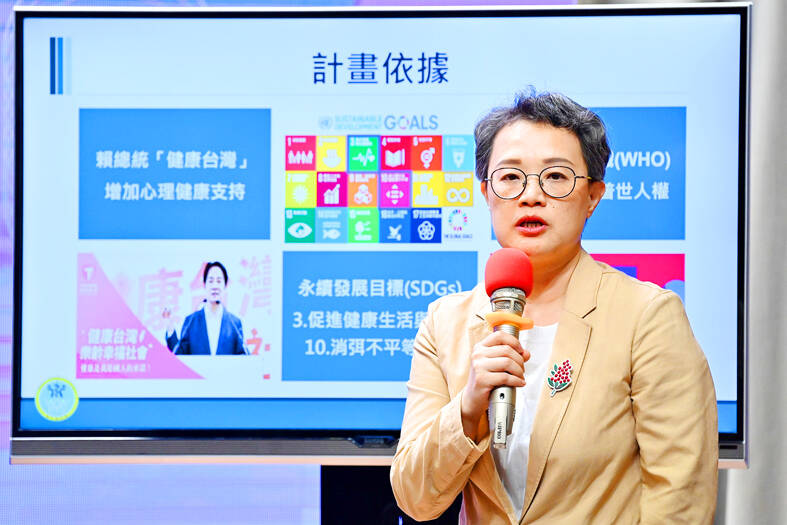The Executive Yuan yesterday approved a six-year, NT$5.63 billion (US$176.5 million) budget to improve mental health coverage.
The Ministry of Health and Welfare proposal to launch a “General Mental Health Resilience Project” would run from next year to 2031.
It would involve 13 ministries and propose six main and 23 ancillary strategies, with 13 key performance indicators, Department of Mental Health Deputy Director Cheng Sheu-shin (鄭淑心) said.

Photo courtesy of the Executive Yuan
The measures aim to promote general mental health, develop a network to ensure continuity in mental health care, step up measures to treat victims of rape and domestic violence, and strengthen infrastructure for digital and technological devices that can be used to treat mental health issues.
The program would seek to standardize mental health resources nationwide to bolster public mental fortitude, and enhance efforts to make such services more accessible in hopes of bringing down suicide rates across the nation, Cheng said.
Emergency medicine should include mental care, and the program would step up local community support to safeguard the rights of mental health patients and reduce, as much as possible, the negative connotations of mental health issues, Cheng said.
The program would also increase subsidies to programs to combat alcoholism an curb Internet addiction, Cheng added.
Cabinet spokesman Chen Shih-kai (陳世凱) quoted Premier Cho Jung-tai (卓榮泰) as saying during the Cabinet meeting that creating a more well-rounded and accessible support system for mental health is in line with President William Lai’s (賴清德) instructions to build a “healthy Taiwan.”
Such a focus also echoes the WHO slogan, “There can be no health without mental health,” and shows that Taiwan’s policies can follow global trends, Cho said.
Government agencies should make mental health a principal part of all policies and work together to create a cohesive whole, Cho said.
He said the policy should be continued until it becomes part of elementary education so that young people grow up knowing the need to express mental and emotional support to others.

US climber Alex Honnold is to attempt to scale Taipei 101 without a rope and harness in a live Netflix special on Jan. 24, the streaming platform announced on Wednesday. Accounting for the time difference, the two-hour broadcast of Honnold’s climb, called Skyscraper Live, is to air on Jan. 23 in the US, Netflix said in a statement. Honnold, 40, was the first person ever to free solo climb the 900m El Capitan rock formation in Yosemite National Park — a feat that was recorded and later made into the 2018 documentary film Free Solo. Netflix previewed Skyscraper Live in October, after videos

Starting on Jan. 1, YouBike riders must have insurance to use the service, and a six-month trial of NT$5 coupons under certain conditions would be implemented to balance bike shortages, a joint statement from transportation departments across Taipei, New Taipei City and Taoyuan announced yesterday. The rental bike system operator said that coupons would be offered to riders to rent bikes from full stations, for riders who take out an electric-assisted bike from a full station, and for riders who return a bike to an empty station. All riders with YouBike accounts are automatically eligible for the program, and each membership account

A classified Pentagon-produced, multiyear assessment — the Overmatch brief — highlighted unreported Chinese capabilities to destroy US military assets and identified US supply chain choke points, painting a disturbing picture of waning US military might, a New York Times editorial published on Monday said. US Secretary of Defense Pete Hegseth’s comments in November last year that “we lose every time” in Pentagon-conducted war games pitting the US against China further highlighted the uncertainty about the US’ capability to intervene in the event of a Chinese invasion of Taiwan. “It shows the Pentagon’s overreliance on expensive, vulnerable weapons as adversaries field cheap, technologically

NUMBERs IMBALANCE: More than 4 million Taiwanese have visited China this year, while only about half a million Chinese have visited here Beijing has yet to respond to Taiwan’s requests for negotiation over matters related to the recovery of cross-strait tourism, the Tourism Administration said yesterday. Taiwan’s tourism authority issued the statement after Chinese-language daily the China Times reported yesterday that the government’s policy of banning group tours to China does not stop Taiwanese from visiting the country. As of October, more than 4.2 million had traveled to China this year, exceeding last year. Beijing estimated the number of Taiwanese tourists in China could reach 4.5 million this year. By contrast, only 500,000 Chinese tourists are expected in Taiwan, the report said. The report